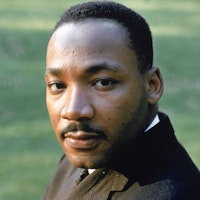Let us realize the arc of the moral universe is long, but it bends toward justice.
Let us realize the arc of the moral universe is long, but it bends toward justice.
Martin Luther King Jr.

The Arc of the Moral Universe
Topic: Justice, Vision, & Leadership
Difficult and painful as it is, we must walk on in the days ahead with an audacious faith in the future. When our days become dreary with low-hovering clouds of despair, and when our nights become darker than a thousand midnights, let us remember that there is a creative force in this universe, working to pull down the gigantic mountains of evil, a power that is able to make a way out of no way and transform dark yesterdays into bright tomorrows. Let us realize the arc of the moral universe is long, but it bends toward justice.
Martin Luther King Jr. was born on January 15, 1929, in Atlanta, Georgia, as Michael Luther King Jr., but later changed his name to Martin. He came from a family of pastors, with his grandfather and father both serving as pastors at the Ebenezer Baptist Church. Martin Luther King Jr. attended segregated public schools and graduated from high school at the age of fifteen. He went on to earn his B.A. degree in 1948 from Morehouse College, where his father and grandfather had also graduated.
After completing three years of theological study at Crozer Theological Seminary, where he was elected president of a predominantly white senior class, King received his B.D. degree in 1951. He then pursued graduate studies at Boston University, where he met and married Coretta Scott. King completed his doctorate in 1955 and had two sons and two daughters with Coretta. Throughout his life, Martin Luther King Jr. played a crucial role in the civil rights movement, advocating for racial equality and justice through nonviolent means. His leadership and inspiring speeches, such as his famous "I Have a Dream" speech, made him a prominent figure in the fight against segregation and discrimination. In 1964, he was awarded the Nobel Peace Prize for his efforts to promote peaceful change and equality for African Americans. Tragically, Martin Luther King Jr. was assassinated on April 4, 1968, but his legacy as a champion of civil rights continues to inspire people around the world.
Wilson, Andrew, editor. World Scripture II. Universal Peace Federation, 2011, p. 760 [Martin Luther King, Jr.: Where Do We Go From Here: Chaos or Community? (New York: Harper and Row, 1967)].

Martin Luther King Jr.
Theme: A Vision of America

About This Martin Luther King, Jr. Quotation [Commentary]
Martin Luther King, Jr. begins with sober realism: “Difficult and painful as it is, we must walk on…with an audacious faith in the future.” The way forward is not denial but to “walk on” while holding “audacious faith” when days grow “dreary with low-hovering clouds of despair” and nights “darker than a thousand midnights.” The sentence about the “arc of the moral universe” is not a quick promise; it names the endurance and steadiness a free people need.
Martin Luther King, Jr. then states the ground for this perseverance: “there is a creative force in this universe,” a power able to “pull down the gigantic mountains of evil,” to “make a way out of no way,” and to “transform dark yesterdays into bright tomorrows.” This invites cooperation rather than passivity. Women and men, young and old, share responsibility to align action with this “creative force” through truthful speech, nonviolence, and neighborly regard.
So when Martin Luther King, Jr. concludes that “the arc of the moral universe is long, but it bends toward justice,” “long” guards against haste and “bends toward justice” guards against resignation. The bend becomes visible when people “walk on,” keep faith, and choose means that match the end. This is a clear vision for America: sustain moral clarity in hard seasons, trust the deeper power at work, and labor together so that justice is made real in law, opportunity, and daily life.
Cornel West on Martin Luther King, Jr.’s Where Do We Go From Here: Chaos or Community?
The philosopher Cornel West remarked:
Martin Luther King, Jr.’s argument for a basic income system to improve the U.S. economy and statements against wealth inequality have been cited by a wide variety of later publications.
Resources
Related Quotes
Copyright © 2017 – 2026 LuminaryQuotes.com About Us